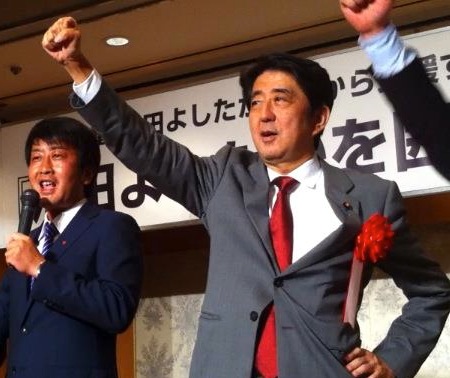
Sooner than expected, Japan is headed to the polls: prime minister Yoshihiko Noda (pictured above) announced today that he will dissolve Japan’s lower house of parliament, the Diet, on Friday, clearing the way for snap elections on December 16. ![]()
It seems very likely that the Liberal Democratic Party of Japan (LDP, or 自由民主党, Jiyū-Minshutō), which controlled the Diet from 1955 to 2009, will return to power, and former Japanese prime minister Shinzō Abe (安倍 晋三), who served exactly one year as prime minister from 2006 to 2007, seems likely to return for a rare second stint leading Japan’s government following his selection as the LDP’s leader in late September.
Noda said the dissolution will be contingent on the LDP’s support for a package of measures to issue deficit-covering bonds this week, but the LDP seemed likely to support that package in any event.
The election will affect at least a half-dozen key policy issues, including relations with China, Japan’s pacifist constitution, a controversial sales tax increase set to go into effect in 2014, the Trans-Pacific Partnership agreement with other Asian countries and the United States, the future role of nuclear energy and fiscal policy in a country that’s seen low GDP growth since the 1980s.
Noda’s announcement was so striking because he needed to call an election only before August 2013, but currently, a record-high 64% of Japanese voters disapprove of his government, with just 18% approving.
Since the Democratic Party of Japan (DPJ, or 民主党, Minshutō) took control of Japan’s parliament after the 2009 elections, things haven’t gone so well for them — the party has gone through three different prime ministers in three years. Continue reading Japan heads to snap elections on December 16
